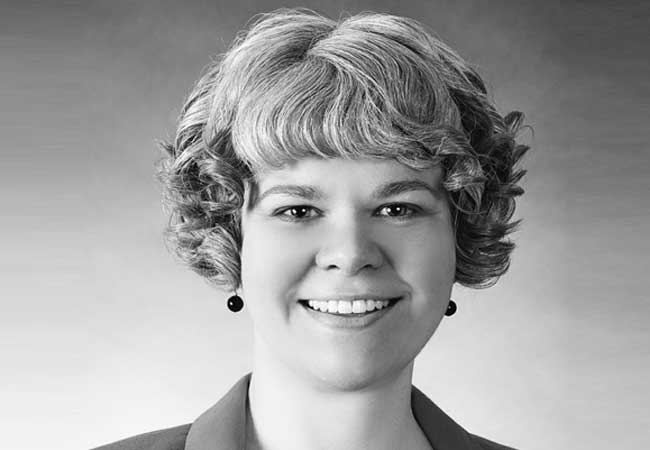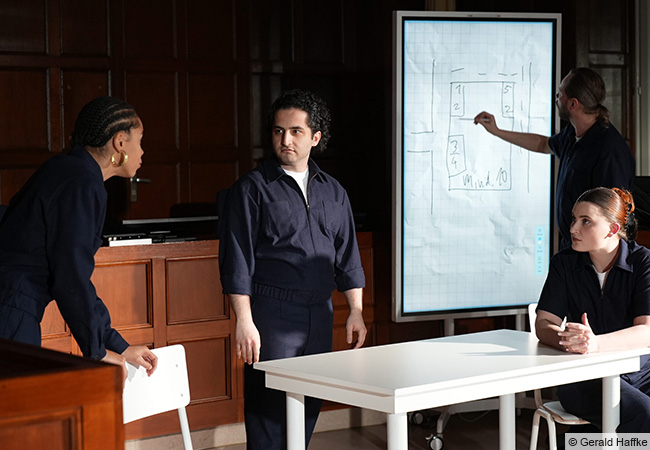For her outstanding achievements in the development of High Performance Computing (HPC), the organisation „Partnership for Advanced Computing in Europe“ (PRACE) honours Dr Sarah Neuwirth from Goethe University Frankfurt with this year’s PRACE Ada Lovelace Award. Neuwirth, deputy group leader of the Modular Supercomputing and Quantum Computing Group, has shown, among other things, for the first time how combinations of main processors (CPUs) and graphics processors (GPUs) can be used to build a modular supercomputer. The award will be presented to her at the Platform for Advanced Scientific Computing Conference (PASC 2023, 26-28 June) in Davos, Switzerland.

“Dr Sarah Neuwirth is a young outstanding computer scientist expert in high-performance communication technologies, whose contributions have a potential impact far beyond her own research fields. Her involvement in exascale European HPC initiatives is also an example of her commitment to the development of technologies at the forefront of HPC-related research and with value for a variety of research fields. Overall, Dr Neuwirth has a great impact on next-generation HPC at a global level.” said Professor Nathalie Reuter, Chair of the Ada Lovelace Award Selection Committee. “The committee also acknowledges her as a role model for women beginning careers in HPC not only because of her visibility in a science, technology, engineering and math (STEM) field, but also through her engagement in outreach activities and her participation in other relevant committees.” adds Reuter.
“We are very happy to present this award to Dr Neuwirth as she is precisely a role model for female scientists, and actually for everyone, to realise that we owe brilliant research outcomes to these persons.” said Serge Bogaerts, PRACE Managing Director. He continued saying “PRACE is proud to have offered visibility to excellent young female scientists, since the creation of the PRACE Ada Lovelace Award, and thereby supports the positive trend of having more balanced gender representation in HPC committees, like the PRACE Scientific Steering Committee to start with.” At the award ceremony at PASC 2023 in Davos Dr Neuwirth will give a keynote talk entitled “Leveraging HPC Performance Engineering to Support Exascale Scientific Discovery”.
Dr Sarah Neuwirth said: “I feel very humbled that my work is being honored with the PRACE Ada Lovelace Award, which is a great medium to raise awareness for diversity in HPC and science. Unfortunately, my own experiences during my undergraduate and doctoral years have made me clearly aware of how much women still struggle in STEM disciplines. Therefore, my greatest dream is to inspire the next generations through teaching, research, and outreach to encourage more women and underrepresented groups to pursue careers in HPC and related STEM subjects.”
Dr Sarah Neuwirth is a leading expert in HPC and networking, focusing on parallel I/O and monitoring technologies, parallel file and storage systems as well as container technologies and management for supercomputers. She boasts a highly impressive record of contributions to research and development in computer and computational science, an accomplishment to which her list of publications ably attests. In her PhD thesis entitled “Accelerating Network Communication and I/O in Scientific High Performance Computing Environments” which she defended summa cum laude – a most impressive achievement – she demonstrated for the first time in the world that it is practically possible to disaggregate CPUs and GPUs and operate both via a (smart) HPC network such that any combination of CPUs and GPUs can be mapped to each other in the spirit of modular supercomputing.
She currently acts as Principal Investigator (PI) in the European Pilot for Exascale (EUPEX) Project co-funded by EuroHPC and the German Federal Ministry of Education and Research (BMBF, according to its German initials). She was previously awarded research grants by the Oak Ridge National Laboratory, where she worked as a visiting research scholar. Dr Neuwirth also played a key role in the series of EU-funded DEEP projects (DEEP and DEEP-ER) as the main expert for the communication technology, as well as in the IT and HPC research of the EC-funded Human Brain project. As a member of the German NHR initiative (National HPC), she is also active in Container and Container Management on a national level.
Many of Dr Neuwirth’s activities clearly demonstrate her growing impact in Europe and internationally. Dr Neuwirth is a consultant and active member on numerous advisory boards and program boards of international conferences, notably for the Institute of Electrical and Electronics Engineers (IEEE), the SC conference and others, some of which she has chaired. She is a member of the IEEE and the Association for Computing Machinery (ACM) and pertinent sub-divisions, and referee as well as editor for quite a few journals and international refereed conferences. She has also been plenary and keynote speaker for international conferences.
Dr Neuwirth is already a highly respected and internationally recognized supercomputer system architect, an area in which only a few females are active. Dr Neuwirth has been a member of the Equal Opportunity Council at Goethe University since 2022, and is an advisory member of the appointment committees. She is often invited to participate in round tables discussing the role of women in HPC at supercomputing conferences in the US and in Europe. In particular, she chaired the SCinet Student Volunteers program at IEEE/ACM SC from 2016 to 2019, acted as the Student Mentoring Chair at IEEE CLUSTER 2022, and still acts as ISC and SC student volunteer program coordinator at German universities to encourage applications from female students and underrepresented groups. Dr Neuwirth is helping to change the pre-conception of what STEM and HPC scientists should look like by encouraging young female talents to join these fields.
Launched in 2016, the PRACE Ada Lovelace Award is awarded annually to a female scientist who makes an outstanding contribution to and impact on HPC in Europe and the world, and who serves as a role model for women who are at the start of their scientific careers. The award is named after the Countess of Lovelace, a British mathematician who lived in the 19th century and, among other things, worked with Charles Babbage on the Machine they called the Analytical Engine — one of the first precursors of computers. Many historians regard Ada Lovelace’s contribution to this mechanical calculator as the very first algorithm – and herself as the first person to be rightly called a programmer.
The Partnership for Advanced Computing in Europe (PRACE) is an international non-profit association (AISBL) with its seat in Brussels. PRACE is currently shifting from providing access to Europe’s largest supercomputers, to expanding, augmenting, and accelerating the representation of the interests of all HPC users in Europe. PRACE ambitions to represent the interest and identify the needs of users of HPC and related technologies (Artificial Intelligence, Quantum Computing, Cloud Computing, Data Science) in Europe and to pursue actions to enable high-impact scientific research and innovation across all disciplines and industrial applications, thereby enhancing European scientific, technological and economic competitiveness for the benefit of society.
PASC 2023 conference: https://pasc23.pasc-conference.org/







